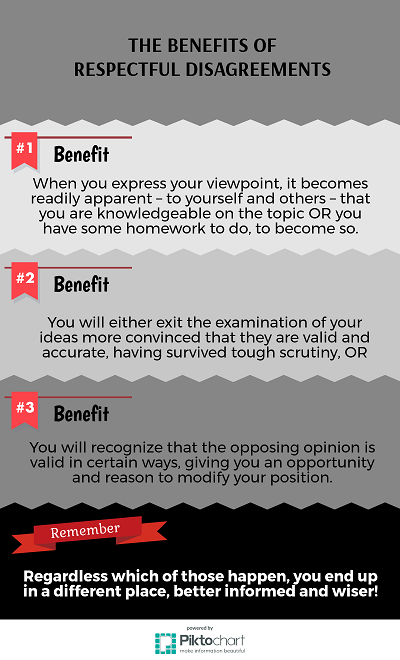I have always believed that talking to people I disagree with has tremendous value, as does reading and watching content that promotes a viewpoint contrary to mine. I must admit, it’s not always easy, but I’m definitely wiser in the end.
I’m pretty sure that perspective is not shared by all – especially lately. The divide between people with opposing views appears to be getting larger, to the point where I’m questioning whether the statement ‘agree to disagree and respectfully coexist’ still applies.
I think the ‘it’s not easy’ part is helping to divide us when the ‘I’m wiser in the end’ part ought to be uniting us. What’s likely causing this divide?
- News and talk shows promote more biased and skewed views of the facts, causing people to completely avoid some shows and gravitate to those they agree with.
- Individuals spend more time in social media engineered echo chambers – having their viewpoints validated by like-minded individuals.
- Businesses encourage employees not to discuss controversial subjects while at work.
- Many companies foster unspoken mandates such as ‘we must all agree for the good of the team’ and ‘don’t say anything that might be upsetting to another.’
In spite of the heralded message to value ALL ideas, it appears we are losing our penchant for valuable, respectful exchange when views differ. I believe that when you recognize there is an opportunity to benefit from the exchange, the benefits reveal themselves.

Take the challenge to grow!
- Move outside your social media feed. Read and watch things you know you will disagree with – at least partially – if not totally.
- Listen to talk shows and watch newscasts that promote opinions different than yours.
- Talk more often to people who disagree with you on certain topics.
Caution: This may cause emotional upset. Decide that no matter what happens, you will stay respectful in what you write, say or do. When interacting, I suggest you adopt the habit of replacing the words right and wrong with agree and disagree, as much as possible.
Telling someone that you’re right and they’re wrong is positioning yourself as the all-knowing judge and jury. In claiming the high ground, you’re suggesting there’s no point in disagreeing with you. Saying right and wrong can end discussions (and infuriate people) while using agree and disagree leaves room to continue the discussion beyond the point of disagreement.
Also, it helps to say “I agree or disagree with your idea” rather than “I agree or disagree with you.” You have ideas, but you and your ideas are not the same things – ideas can more easily be changed.
You can have great conversations and relationships with people you disagree with – even strongly disagree with. I disagree with many of my friends over multiple issues, and I love that we remain friends.
In fact, I value them – even more – because we have learned to disagree, learn from each other, and continue a relationship. More important, you can too!
That’s my perspective, what’s yours? Leave us a comment or question below this post, and thanks for listening!
